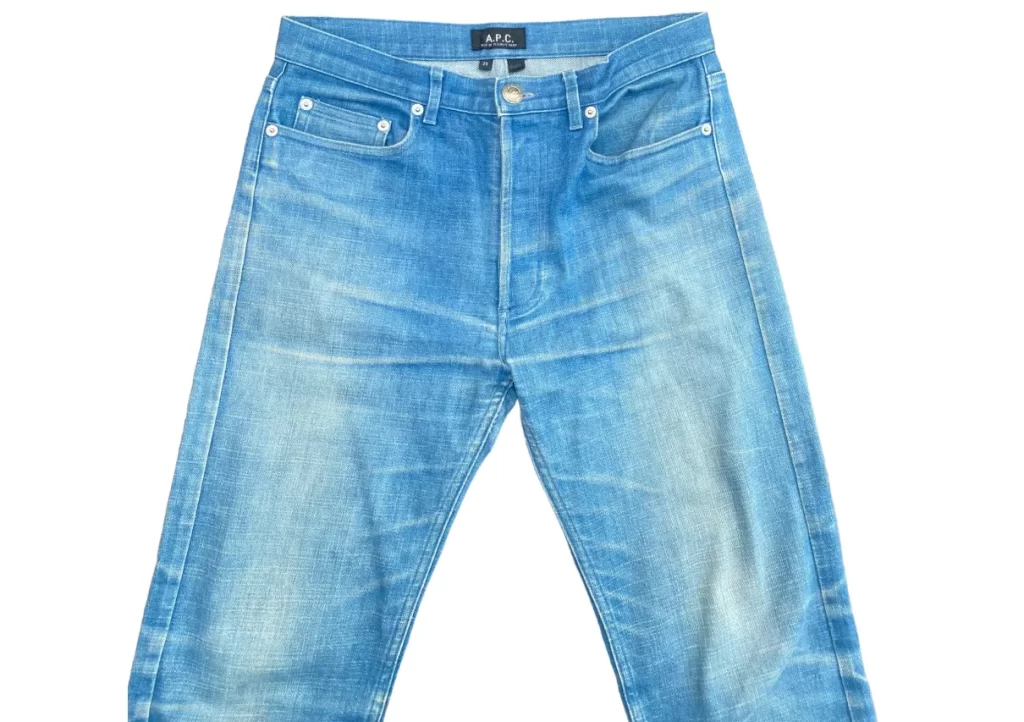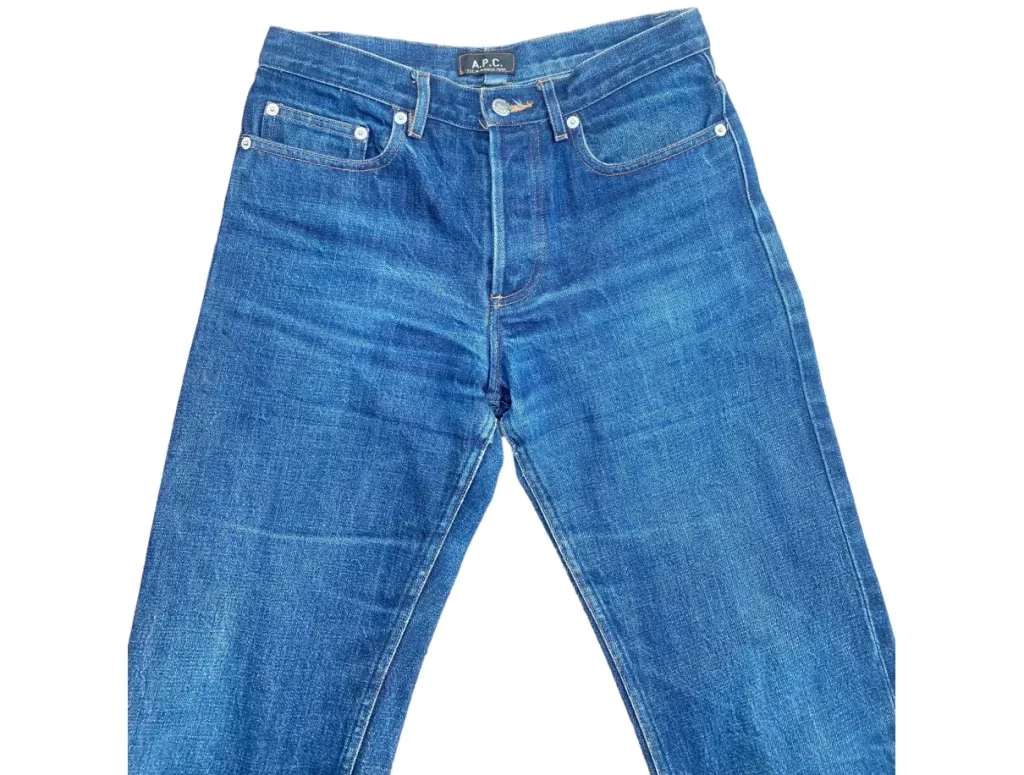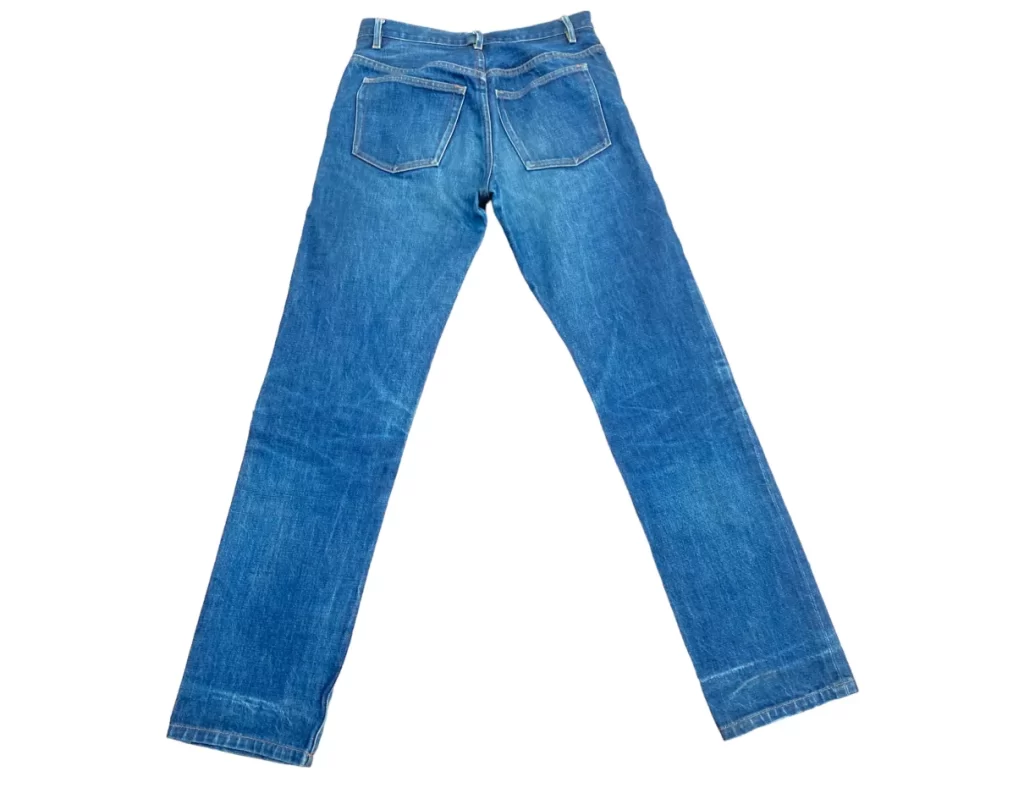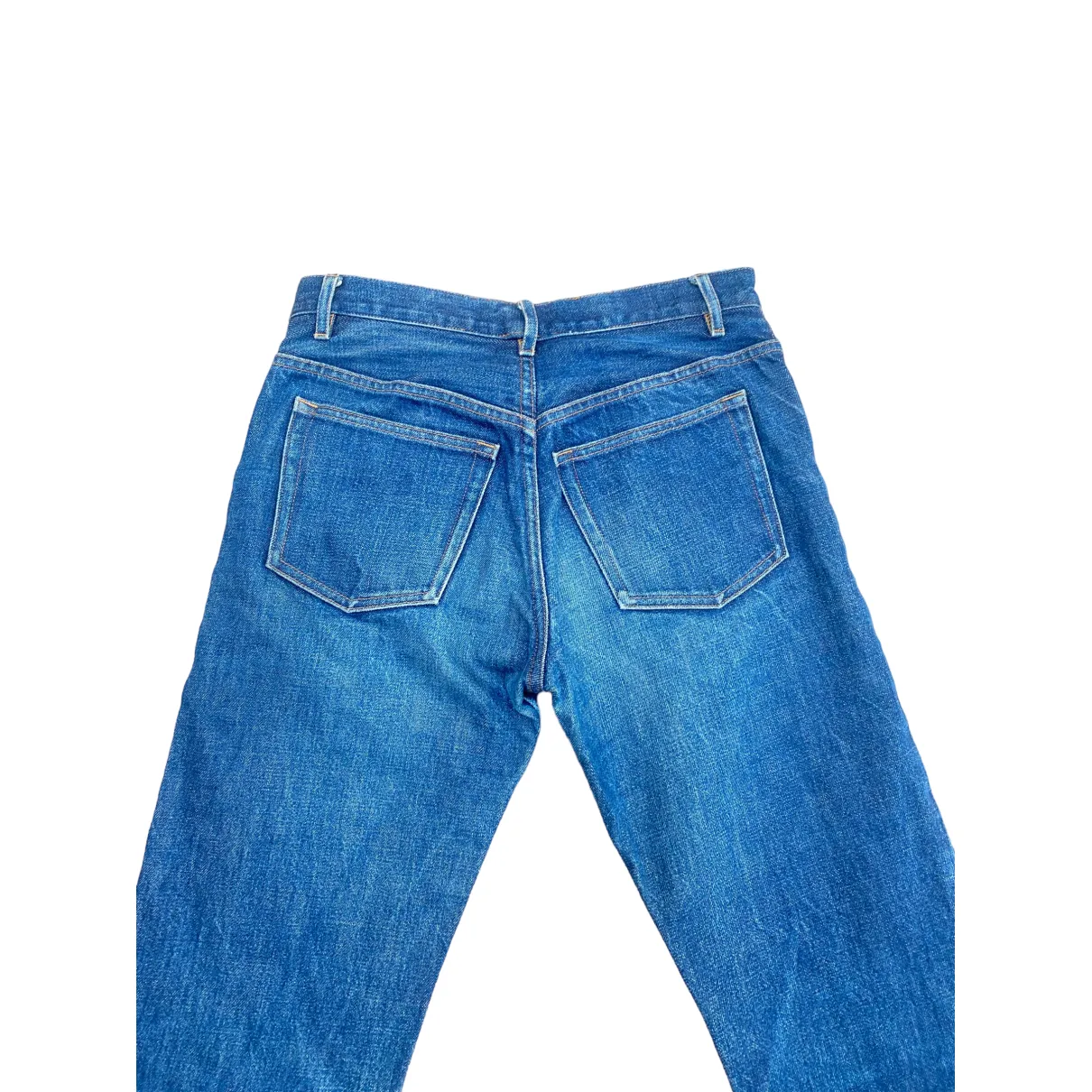The evolution of A.P.C.
A.P.C. is a French fashion brand known for its minimalist, casual designs. Founded in 1987 by Jean Touitou, A.P.C. has since become an essential in the fashion world, renowned for its timeless, understated pieces that blend traditional craftsmanship with modern design.
A.P.C.’s most iconic pieces include their raw denim jeans, classic button-down shirts and simple, elegant bags and accessories. The brand is also known for its collaborations with other designers and artists, including Nike and Kanye West.
In recent years, A.P.C. has made sustainability a priority in its production process, working to reduce its carbon footprint and use eco-friendly materials. The brand has also launched a recycling program to reduce waste and promote circular fashion.
Thanks to its focus on quality, simplicity and sustainability, A.P.C. continues to be a major force in the fashion industry, inspiring a new generation of designers and fashion enthusiasts.

The roots of raw denim: How A.P.C. began
A.P.C. founder Jean Touitou launched the brand in 1987 with a vision of creating timeless, minimalist garments that would be accessible to a wide audience. Touitou’s background in fashion design and production led him to focus on high-quality materials and traditional craftsmanship for A.P.C. garments.
One of A.P.C.’s biggest early successes was its raw denim jeans, which quickly became a cult favorite among fashion enthusiasts. Raw denim is untreated, unwashed denim that is initially stiff and dark, fading and shaping to the wearer’s morphology over time. A.P.C.’s raw denim jeans were popular for their simple design, high-quality construction and ability to age beautifully with wear.
Over the years, A.P.C. has expanded beyond simple raw denim jeans, but the brand’s commitment to high-quality, minimalist design has remained constant. Today, A.P.C.’s offerings include a range of apparel, accessories and footwear, all with the same understated, casual style that has made the brand a favorite of fashion insiders and mainstream consumers alike.
The rise of minimalist fashion: A.P.C.’s impact on the industry

A.P.C.’s focus on minimalist design and high-quality materials has had a significant impact on the fashion industry as a whole. In the 1990s, when the brand was still relatively new, it stood out among a sea of trendy, logo-centric fashion. A.P.C.’s understated designs were a breath of fresh air for consumers looking for timeless, versatile clothing they could wear for years.
As A.P.C. continued to grow and gain an audience, other brands began to take note of the minimalist trend. Today, minimalist fashion is more popular than ever, with many designers and brands prioritizing simplicity and quality over trend and flash.
A.P.C.’s influence on the fashion industry can be seen not only in the prevalence of minimalist design, but also in the brand’s collaborations with other fashion and lifestyle brands and companies. A.P.C. has worked with Nike, Carhartt and even Parisian furniture company Vitra to create limited collections that blend A.P.C.’s minimalist aesthetic with the unique styles and sensibilities of their collaborators.
Overall, A.P.C.’s impact on the fashion industry has been significant, inspiring other brands to prioritize quality, simplicity and timelessness in their designs.
Balancing sustainability and style: A.P.C.’s approach to ecological fashion

A.P.C. has long been recognized for its commitment to quality and timeless design, but in recent years the brand has also made a conscious effort to prioritize sustainability and environmental friendliness in its manufacturing processes.
One of the ways in which A.P.C. works to reduce its environmental impact is by using organic cotton in its garments. Organic cotton is grown without harmful pesticides or fertilizers, making it better for the environment and the health of farmers and their communities. A.P.C. also uses recycled materials in some of its products, such as recycled wool and polyester.
In addition to using environmentally-friendly materials, A.P.C. is also committed to reducing waste in its production processes. The brand has set up a program to reduce fabric waste by using scraps to create new products, such as patchwork bags and accessories. A.P.C. also encourages its customers to recycle their old clothes by offering them a discount on new purchases when they bring in old A.P.C. garments for recycling.
However, A.P.C. recognizes that true sustainability also means creating products that are built to last. The brand’s emphasis on timeless design and high-quality materials means that A.P.C. garments are designed to be worn for years, rather than discarded after a single season.
Overall, A.P.C.’s approach to eco-fashion strikes a balance between style and sustainability, prioritizing quality, longevity and friendship with the environment in its products and manufacturing processes.
Production innovations: How A.P.C. is reducing its carbon footprint
A.P.C. is committed to reducing its carbon footprint by implementing innovative production methods and using sustainable materials. One of the ways the brand achieves this is by reducing its reliance on water-intensive dyeing processes. Instead, A.P.C. uses techniques such as laser printing and digital printing to create unique patterns and designs on its garments without using excess water.
Another way A.P.C. reduces its carbon footprint is by sourcing local raw materials whenever possible. By reducing transport emissions, the brand is able to reduce its overall carbon footprint. A.P.C. also uses renewable energy sources in its manufacturing facilities, such as wind and solar power, to further reduce its environmental impact.
In addition, A.P.C. is also exploring new materials and production techniques to reduce its use of non-renewable resources. For example, the brand is experimenting with plant-based materials such as hemp and linen, which require less water and fewer pesticides than traditional cotton.
Overall, A.P.C. is committed to reducing its carbon footprint by exploring innovative production methods and using sustainable materials. By prioritizing ecology and reducing its dependence on non-renewable resources, A.P.C. is at the forefront of sustainable fashion.
Conclusion
A.P.C.’s commitment to sustainability and ecology is a testament to its determination to reduce its environmental impact. With innovative production methods, local materials and a focus on renewable energy sources, the brand is leading the way in sustainable fashion. As A.P.C. continues to explore new materials and production techniques, it sets an example for other brands in the industry to prioritize ecology and reduce their carbon footprint. As consumers become increasingly aware of the importance of sustainability, A.P.C.’s efforts to strike a balance between sustainability and style should pay off in the long term.






